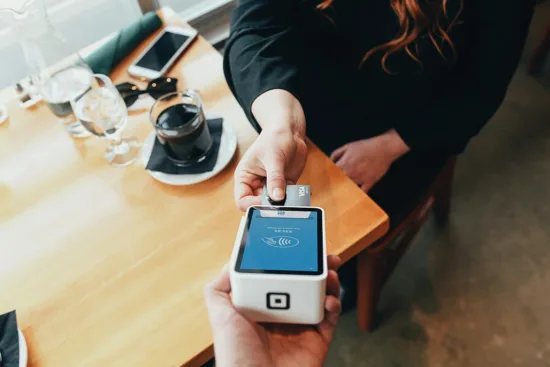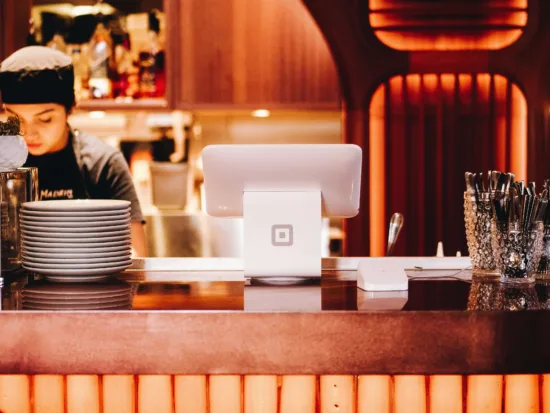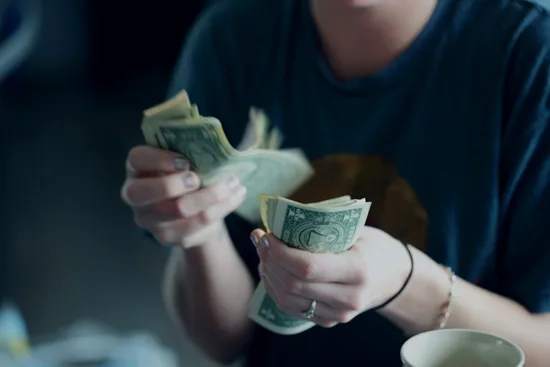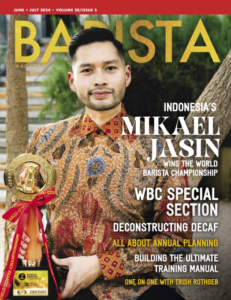Let’s Talk About: Tipping Culture in the U.S.: Part Two
We deepen our discussion about tipping culture and whether or not tips should be expected in café settings.
BY EMILY JOY MENESES
BARISTA MAGAZINE ONLINE
Featured photo by Sam Truong
Today we’re continuing our series “Let’s Talk About: Tipping Culture in the U.S.,” where we explore the debates surrounding American tipping culture, and whether or not tipping should be expected of customers in café settings. In part one of this series, we explored how baristas’ wages in the United States. aren’t keeping up with a rapidly changing economy, and thus, many coffee workers are dependent upon tips to survive. Today, we’ll look at the other side of the coin: the group of people saying that while baristas do deserve higher pay, tipping isn’t necessarily the answer.

Opinion 2: Baristas should be paid more … but tipping isn’t the solution.
While most working in the coffee industry agree that coffee workers need to be paid more, some argue that tipping culture is harming, rather than helping, the cause by normalizing low starting wages.
“Tipping should never be part of the culture of any café, because employers should pay a reasonable wage to begin with,” shares Barista Mag reader Jet M., who’s based in Idaho and has worked in the coffee industry since 2016. “It isn’t your customers’ responsibility to pay (baristas) a living wage.”
Though based in Canada, Fred Sztabinski shares how he has begun looking for other solutions through his Toronto café and bike shop, Fix Coffee + Bikes, and how that model could be mirrored in the United States. “We changed to a hospitality-included model almost four years ago and upped our hourly wage (for) staff, so they have a consistent and reliable income,” he explains. “Customers seem to like not having to consider tipping—the price they see is the price they pay, no need or expectation to add anything extra.”
Like Fred, Zayde Naquib, the original founder of Los Angeles’ Bar Nine Coffee, implemented a gratuity-free structure at his café back in 2016, running it until he parted ways with the shop in 2024. “(Through our) hospitality-included and gratuity-free approach, baristas did better and could rely on guaranteed income,” he shares. “We raised wages about 33% at the time across the board and instituted a new revenue share program with bonuses when the business met certain markers … to me, this is the only way to approach this.”
“The biggest issue our industry at large faces is the lack of desire on the consumer end to pay more for their coffee,” Zayde continues. “The best way to combat any ‘sticker shock’ (for the customer) is to deliver an experience that transcends, which starts and ends with hospitality.”
Through Zayde’s gratuity-free program, employee wages went up significantly—which the coffee shop accounted for by slightly raising menu prices. Zayde points out how, surprisingly, after raising prices and eliminating gratuities, customers ended up actually saving money overall. “On an individual item, our average tip was 85 cents, and our average price increase was 50 cents,” he explains. “The amount people paid, in most cases, actually (went) down.”

Taking History into Account
When discussing the topic of tipping, it’s important to consider the practice’s dark history in the United States. An article by Michelle Alexander, a civil rights activist and the author of The New Jim Crow, explains how tipping was influenced by racism and slavery in the United States.
The practice of tipping originated in Europe, according to Michelle, as “noblesse oblige,” a practice among aristocrats to favor their well-performing servants, but morphed into something else entirely. After the Civil War, white restaurant owners used tips as an excuse to not pay Black workers consistent wages, forcing them to rely on tips alone. This practice also extended to female restaurant workers, and today, low wages in the United States remain a reflection of race and gender inequity throughout the nation.
Cultural Differences
It’s also important to consider how tipping norms vary from country to country. In parts of countries like Japan, Thailand, and Turkey, for example, tipping is considered unnecessary and sometimes even rude. Each country’s unique culture and economy plays a role in shaping expectations around tipping—and, of course, you should take that into consideration when traveling to different areas.


Where to Go from Here
So … what’s the answer here? The debate around tipping is complex and multifaceted—and moving forward, we may need to take a little bit of information from both sides. While coffee workers do need to be paid more hourly, the reality is that they often aren’t—which means, in the meantime, it doesn’t hurt for customers to throw in a few extra dollars. However, we shouldn’t lose focus of the fact that, quite simply, wages are too low and the cost of living is too high. And tips aren’t going to magically solve all of those problems.
Innovative models like Zayde’s gratuity-free structure show promise by ensuring consistent and reliable incomes for baristas, while also keeping customers’ and small-business owners’ concerns and well-being in mind. As we move forward, a balanced approach that advocates for fair wages and acknowledges the current economic realities faced by baristas is essential. Ultimately, while tipping can offer short-term support, the long-term solution lies in systemic changes to wage structures within the industry.
ABOUT THE AUTHOR
Emily Joy Meneses (she/they) is a writer and musician based in Los Angeles. Her hobbies include foraging, cortados, vintage synths, and connecting with her Filipino roots through music, art, food, and beverage.


Subscribe and More!
Out now: It’s the June + July 2024 issue of Barista Magazine! Read it for free with our digital edition. And for more than three years’ worth of issues, visit our digital edition archives here.
You can order a hard copy of the magazine through our online store here. Or you can start a subscription for one year or two.
Source: Barista Magazine



